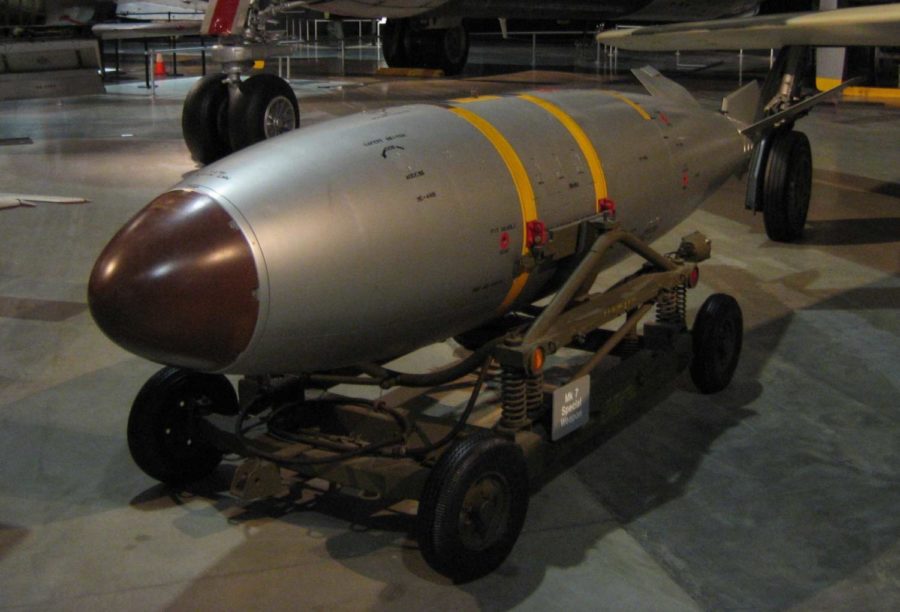“Reconsidering Nuclear”
A Mark 7 Nuclear Bomb at the National Museum of the United States Air Force.
The House of Representatives is currently debating whether or not the United States should lead the world in preventing further nuclear proliferation and simultaneously reduce, with the intent of eventually eliminating, all nuclear weapons use. The bill, H.Res.54, was introduced January 21st, 2021, referred to the Committee on Foreign Affairs, and is on track to be agreed/eliminated in the House. According to a nationwide poll by the Pew Research Center, the split between proliferation advocacy and opposing nuclear eradication is jarringly close, with a three-point gap. Although many Americans have a persisting notion characterizing such weaponry as solely lethal, because of their reliability and capability of deterring war, nuclear weapons cannot be eliminated. While non-proliferation efforts may still be promoted, the utility of nuclear weaponry simply cannot be undermined under appropriate usage.
Under appropriate use, nuclear weapons are reliable, as demonstrated in the technology’s testing efficacy and the lives it has saved. According to the Union of Concerned Scientists, American stockpiles of over 10,000 warheads are highly reliable in time efficiency and launch range and will remain so for decades to come. These weapons have been trialed consistently by the Secretaries of Energy and Defense and are only certified to the President after intense scrutiny and experimentation. The caliber of safety presented in the weaponry is extremely high, which becomes clear when considering historical precedent. From the Cold War to the First Gulf War, nuclear weaponry has saved gruesome attacks on the lives of millions of American soldiers in order to prevent nuclear escalation with armed states. Although some would associate nuclear technology with massive consequences, in reality, proper usage has brought about deescalation, as states and allies will spare no expense to ensure that unnecessary conflict is prevented. Americans advocating for the elimination of such weapons would suffer a loss of a reliable war mechanism and the possibility of circumventing casualties in the future.
Allied proliferation, to a certain extent, is inevitable with or without the U.S.’s involvement in the matter. According to the LA Times, thirty NATO member states currently rely on the United States’ nuclear umbrella for protection and defense in foreign diplomacy and have publicly stated that if the country were to push for the complete expulsion of nuclear technology, they would feel compelled to “take matters into their own hands.” Contrary to the abolitionist perspective, banning nuclear technology would induce global proliferation, especially in countries which tend to misuse such weaponry. European states that recognize the dangers of nuclear weapons under improper use have proposed joint partnerships to the United States of promoting non-proliferation while straying away from complete expulsion. In fact, foreign officials from France and the United Kingdom, which the United States has established significant alliances with, have publicly declared disdain for the abolishment of nuclear weaponry and will be encouraged to build their own arsenal in the event that the U.S.’s umbrella vanishes.
With regards to diplomacy, nuclear weapons have a remarkably unique capability of deterring war. Opponents argue that, in the wrong hands, one nuclear weapon is dangerous enough to kill an entire city with long-term implications on the environment and health conditions. However, due to the potential risk such technology poses, Pry explains that US nuclear deterrence has saved many lives. He states, “Nuclear victory looks like the 200,000 casualties of Hiroshima and Nagasaki. But also like Japan surrendering on the deck of the USS Missouri, sparing over 1,000,000 casualties expected from invading their home islands and ending World War I” (Pry 2019). Americans often look at deterrence rhetoric on the surface level, failing to recognize the implicit implications nuclear weapons have on deterring war efforts as to prevent future casualty. In observance of historical precedent, nuclear weaponry has been utilized appropriately to mitigate losses of life, which is why its eventual elimination is not only illogical but infeasible. The Congressional Research Service states that the threat of nuclear escalation promotes non-proliferation while deterring large-scale conventional war and CBWs, or chemical and biological weapons. Conventional weaponry can be just as deadly as nuclear weapons, if not, even more so, which is why a U.S. nuclear umbrella encourages more countries to join the nation as allies to prevent external and harmful proliferation. Ending nuclear weapons due to false, superficial attacks on deterrence efficacy would leave more room for the development of proliferation elsewhere and research dedicated to even more lethal CBWs, which pose an equivocally harmful outcome for international warfare.
In the modern era, nuclear weapons seem to be moving towards a realm of inevitable non-proliferation tactics, but cannot afford to be eliminated due to the invaluable deterrence opportunities they offer in times of war. Looking at both sides of the argument—one deeper than the negativity and harm nuclear weaponry is often tied to—may help paint a different picture for Americans. The reality of the situation, given the impact analysis of nuclear weaponry, is that we, as a nation, could not only do good with them. We need them.






